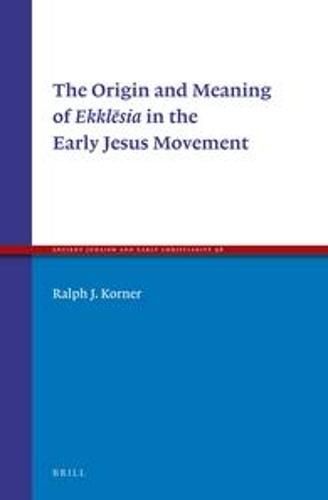Readings Newsletter
Become a Readings Member to make your shopping experience even easier.
Sign in or sign up for free!
You’re not far away from qualifying for FREE standard shipping within Australia
You’ve qualified for FREE standard shipping within Australia
The cart is loading…






In The Origin and Meaning of Ekklesia in the Early Jesus Movement, Ralph J. Korner explores the ideological implications of Christ-follower associations self-designating collectively as ekklesiai. Politically, Korner’s inscriptional research suggests that an association named ekklesia would have been perceived as a positive, rather than as a counter-imperial, participant within Imperial Greek cities. Socio-religiously, Korner argues that there was no universal ekklesia to which all first generation Christ-followers belonged; ekklesia was a permanent group designation used by Paul’s associations. Ethno-religiously, Korner contends that ekklesia usage by intra muros groups within pluriform Second Temple Judaism problematizes suggestions, not least at the institutional level, that Paul was parting ways with Judaism(s), ‘Jewishness’, or Jewish organizational forms.
$9.00 standard shipping within Australia
FREE standard shipping within Australia for orders over $100.00
Express & International shipping calculated at checkout
In The Origin and Meaning of Ekklesia in the Early Jesus Movement, Ralph J. Korner explores the ideological implications of Christ-follower associations self-designating collectively as ekklesiai. Politically, Korner’s inscriptional research suggests that an association named ekklesia would have been perceived as a positive, rather than as a counter-imperial, participant within Imperial Greek cities. Socio-religiously, Korner argues that there was no universal ekklesia to which all first generation Christ-followers belonged; ekklesia was a permanent group designation used by Paul’s associations. Ethno-religiously, Korner contends that ekklesia usage by intra muros groups within pluriform Second Temple Judaism problematizes suggestions, not least at the institutional level, that Paul was parting ways with Judaism(s), ‘Jewishness’, or Jewish organizational forms.